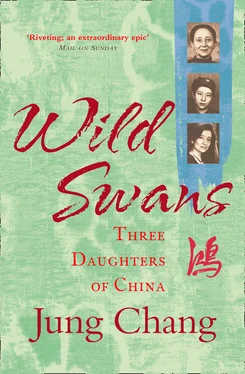Jung Chang - Wild Swans
Здесь есть возможность читать онлайн «Jung Chang - Wild Swans» — ознакомительный отрывок электронной книги совершенно бесплатно, а после прочтения отрывка купить полную версию. В некоторых случаях можно слушать аудио, скачать через торрент в формате fb2 и присутствует краткое содержание. Жанр: unrecognised, на английском языке. Описание произведения, (предисловие) а так же отзывы посетителей доступны на портале библиотеки ЛибКат.
- Название:Wild Swans
- Автор:
- Жанр:
- Год:неизвестен
- ISBN:нет данных
- Рейтинг книги:5 / 5. Голосов: 1
-
Избранное:Добавить в избранное
- Отзывы:
-
Ваша оценка:
- 100
- 1
- 2
- 3
- 4
- 5
Wild Swans: краткое содержание, описание и аннотация
Предлагаем к чтению аннотацию, описание, краткое содержание или предисловие (зависит от того, что написал сам автор книги «Wild Swans»). Если вы не нашли необходимую информацию о книге — напишите в комментариях, мы постараемся отыскать её.
Wild Swans — читать онлайн ознакомительный отрывок
Ниже представлен текст книги, разбитый по страницам. Система сохранения места последней прочитанной страницы, позволяет с удобством читать онлайн бесплатно книгу «Wild Swans», без необходимости каждый раз заново искать на чём Вы остановились. Поставьте закладку, и сможете в любой момент перейти на страницу, на которой закончили чтение.
Интервал:
Закладка:
These houses were built to cope with the extremes of a brutally harsh climate, which lurched from freezing winters to scorching summers, with virtually no spring or autumn in between. In summer, the temperature could rise above 95°F, but in winter it fell to minus 20°F, with howling winds which roared down from Siberia across the plains. Dust tore into the eyes and bit into the skin for much of the year, and people often had to wear masks which covered their entire faces and heads. In the inner courtyard of the houses, all the windows in the main rooms opened to the south to let in as much sunshine as possible, while the walls on the north side took the brunt of the wind and the dust. The north side of the house contained a sitting room and my grandmother’s chamber; the wings on the two sides were for the servants and for all other activities. The floors of the main rooms were tiled, while the wooden windows were covered with paper. The pitched roof was made of smooth black tiles.
The house was luxurious by local standards—and far superior to her parents’ home—but my grandmother was lonely and miserable. There were several servants, including a doorkeeper, a cook, and two maids. Their task was not only to serve, but also to act as guards and spies. The doorkeeper was under instructions not to let my grandmother out alone under any circumstances. Before he left, General Xue told my grandmother a cautionary tale about one of his other concubines. He had found out that she had been having an affair with a male servant, so he had her tied to a bed and stuffed a gag into her mouth. Then raw alcohol was dripped onto the cloth, slowly choking her to death. ‘Of course, I could not give her the pleasure of dying speedily. For a woman to betray her husband is the vilest thing possible,’ he said. Where infidelity was involved, a man like General Xue would hate the woman far more than the man. ‘All I did with the lover was have him shot,’ he added casually. My grandmother never knew whether or not all this had really happened, but at the age of fifteen she was suitably petrified.
From that moment she lived in constant fear. Because she could hardly ever go out, she had to create a world for herself within the four walls. But even there she was not the real mistress of her home, and she had to spend a great deal of time buttering up the servants in case they invented stories against her—which was so common it was considered almost inevitable. She gave them plenty of presents, and also organized mah-jongg parties, because the winners would always have to tip the servants generously.
She was never short of money. General Xue sent her a regular allowance, which was delivered every month by the manager of his pawnshop, who also picked up the bills for her losses at the mah-jongg parties.
Throwing mah-jongg parties was a normal part of life for concubines all over China. So was smoking opium, which was widely available and was seen as a means of keeping people like her contented—by being doped—and dependent. Many concubines became addicted in their attempts to cope with their loneliness. General Xue encouraged my grandmother to take up the habit, but she ignored him.
Almost the only time she was allowed out of the house was to go to the opera. Otherwise, she had to sit at home all day, every day. She read a lot, mainly plays and novels, and tended her favourite flowers, garden balsam, hibiscus, common four-o’clock, and roses of Sharon in pots in the courtyard, where she also cultivated dwarf trees. Her other consolation in her gilded cage was a cat.
She was allowed to visit her parents, but even this was frowned upon, and she was not permitted to stay the night with them. Although they were the only people she could talk to, she found visiting them a trial. Her father had been promoted to deputy chief of the local police because of his connection to General Xue, and had acquired land and property. Every time she opened her mouth about how miserable she was, her father would start lecturing her, telling her that a virtuous woman should suppress her emotions and not desire anything beyond her duty to her husband. It was all right to miss her husband, that was virtuous, but a woman was not supposed to complain. In fact, a good woman was not supposed to have a point of view at all, and if she did, she certainly should not be so brazen as to talk about it. He would quote the Chinese saying, ‘If you are married to a chicken, obey the chicken; if you are married to a dog, obey the dog.’
Six years passed. To begin with, there were a few letters, then total silence. Unable to burn off her nervous energy and sexual frustration, unable even to pace the floor with a full stride because of her bound feet, my grandmother was reduced to mincing around the house. At first, she hoped for some message, going over and over again in her mind her brief life with the general. Even her physical and psychological submission was mulled over nostalgically. She missed him very much, though she knew that she was only one of his many concubines, probably dotted around China, and she had never imagined that she would spend the rest of her life with him. Still she longed for him, as he represented her only chance to live a sort of life.
But as the weeks turned into months, and the months into years, her longing became dulled. She came to realize that for him she was a mere plaything, to be picked up again only when it was convenient for him. Her restlessness now had no object on which to focus. It became forced into a straitjacket. When occasionally it stretched its limbs she felt so agitated she did not know what to do with herself. Sometimes, she would fall to the floor unconscious. She was to have blackouts like these for the rest of her life.
Then one day, six years after he had walked casually out of the door, her ‘husband’ reappeared. The meeting was very unlike what she had dreamed of at the beginning of their separation. Then she had fantasized that she would give herself totally and passionately to him, but now all she could find in herself was restrained dutifulness. She was also racked with anxiety in case she might have offended one of the servants, or that they might invent stories to ingratiate themselves with the general and ruin her life. But everything went smoothly. The general, now past fifty, seemed to have mellowed, and did not look nearly as majestic as before. As she expected, he did not say a word about where he had been, why he had left so suddenly, or why he was back, and she did not ask. Quite apart from not wanting to be scolded for being inquisitive, she did not care.
In fact, all this time the general had not been far away at all. He had been leading the quiet life of a wealthy retired dignitary, dividing his time between his house in Tianjin and his country mansion near Lulong. The world in which he had flourished was becoming a thing of the past. The warlords and their fief system had collapsed and most of China was now controlled by a single force, the Kuomintang, or Nationalists, headed by Chiang Kai-shek. To mark the break with the chaotic past, and to try to give the appearance of a new start and of stability, the Kuomintang moved the capital from Peking (‘Northern Capital’) to Nanjing (‘Southern Capital’). In 1928, the ruler of Manchuria, Chang Tso-lin, the Old Marshal, was assassinated by the Japanese, who were becoming increasingly active in the area. The Old Marshal’s son, Chang Hsueh-liang (known as the Young Marshal), joined up with the Kuomintang and formally integrated Manchuria with the rest of China—though Kuomintang rule was never effectively established in Manchuria.
General Xue’s visit to my grandmother did not last long. Just like the first time, after a few days he suddenly announced he was leaving. The night before he was due to leave, he asked my grandmother to go and live with him at Lulong. Her heart missed a beat. If he ordered her to go, it would amount to a life sentence under the same roof as his wife and his other concubines. She was invaded by a wave of panic. As she massaged his feet, she quietly pleaded with him to let her stay in Yixian. She told him how kind he was to have promised her parents he would not take her away from them, and gently reminded him that her mother was not in good health: she had just had a third child, the longed-for son. She said that she would like to observe filial piety, while, of course, serving him, her husband and master, whenever he graced Yixian with his presence. The next day she packed his things and he left, alone. On his departure, as on his arrival, he showered jewels on my grandmother—gold, silver, jade, pearls, and emeralds. Like many men of his kind, he believed this was the way to a woman’s heart. For women like my grandmother, jewellery was their only insurance.
Читать дальшеИнтервал:
Закладка:
Похожие книги на «Wild Swans»
Представляем Вашему вниманию похожие книги на «Wild Swans» списком для выбора. Мы отобрали схожую по названию и смыслу литературу в надежде предоставить читателям больше вариантов отыскать новые, интересные, ещё непрочитанные произведения.
Обсуждение, отзывы о книге «Wild Swans» и просто собственные мнения читателей. Оставьте ваши комментарии, напишите, что Вы думаете о произведении, его смысле или главных героях. Укажите что конкретно понравилось, а что нет, и почему Вы так считаете.












